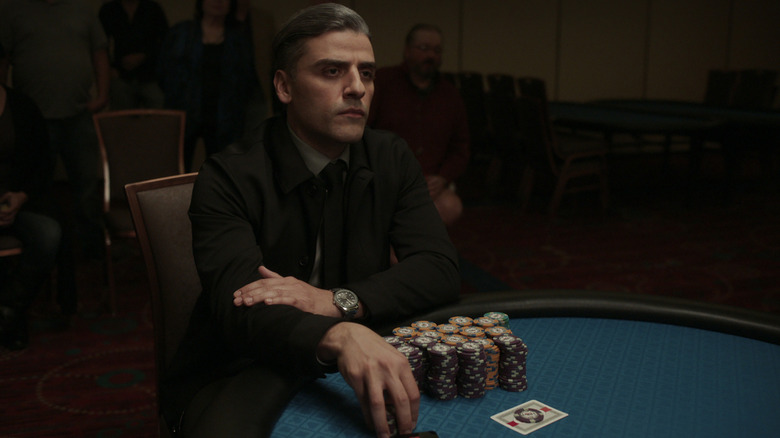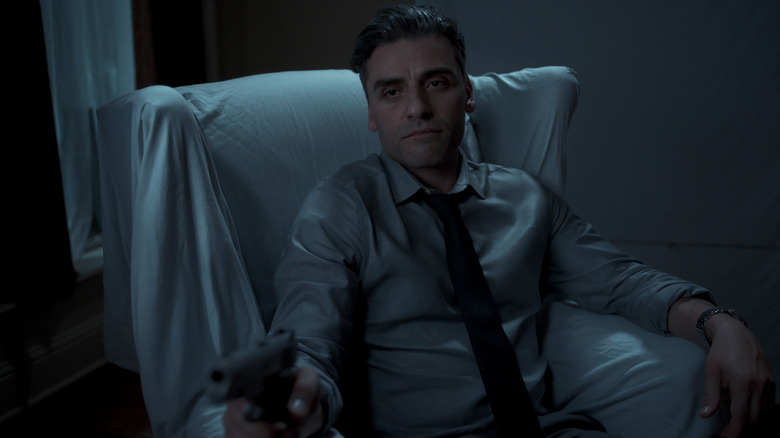The Card Counter Review: Paul Schrader's Anti-Revenge Film Features A Strong Oscar Isaac Performance
"I have modest goals." So says William Tell, the soldier-turned-gambler at the center of Paul Schrader's anti-revenge film "The Card Counter." As played by Oscar Isaac, he's an eerily cool, calm, and still man. Nothing ever seems out of place with this character. His hair slicked back, his clothes tailored tight to his body, he looks like something chiseled; something created. Preternatural, even. He's quiet, and his eyes are dark, and deep, and haunting. And haunted. Isaac is one of the best actors working right now, the heir apparent to the young Al Pacino, and he brings a disarmingly handsome intensity to the role here. We can't take our damn eyes off him.
Tell gambles for a living, and he counts cards to win. But he never wins big. He's not out for a big score, he's not trying to break the bank. He's just getting by. He drifts from town to town, casino to casino, a loner decked out in black. He has no home, at least no home that we ever see. Instead, he spends his nights in motel rooms. He books a room and performs a ritual: he removes anything remarkable, like a painting on the wall. And then he wraps lamps, chairs, and any other furniture in white sheets and twine. It's a strange, almost religious action, as if he were on the cusp of a purification ceremony. What makes this man tick? What's going on in his head?
We get some insight into that head, because — just like Ethan Hawke's doomed reverend in Schrader's "First Reformed," and just like Travis Bickle in the Schrader-scripted "Taxi Driver" — Tell is telling his story. To who? Us? Himself? Someone else? It doesn't matter. He sits in the dark, a glass of alcohol close by, and scribbles away in a book. The writing, like the sheet-wrapping, feels ritualistic. Compulsory. He's not writing this down because he wants to. He's writing it down because he has to.
Something — call it fate, chance, or maybe luck — causes Tell to meet Cirk (Tye Sheridan), a directionless young man with the angry fire of a thousand suns burning beneath his schlubby t-shirts. Cirk doesn't know it, but he already has a connection to Tell. Sort of. Cirk's father was in the military with Tell, and both men were among the soldiers who tortured prisoners at Abu Ghraib. The same sort of soldiers we all saw in those horrific photos; standing next to battered and nude prisoners, flashing big greens and offering a gloved thumbs-up. "How can someone do something like that?" you ask when you see photos like that. "What makes a person behave so inhumanely?"
Some monsters aren't born, they're made. And Tell was turned into the torturer he became by a sleazy, self-righteous contractor named Major John Gordo, played with the perfect amount of weasely menace by Willem Dafoe. As haunted and damaged as he may be, Tell doesn't seem all that interested in Gordo. But Cirk holds Gordo personally responsible for his father's ruin, and he wants bloody revenge. He's not afraid to inform Tell of this, either, although he barely knows the guy. Cirk wants Tell to help him get Gordo, but Tell has other ideas. He seems some glimmer of hope — and maybe personal redemption — in this kid, if he can just help him out.
"There's No Way To Justify What We Did"
With Cirk in his life, Tell decides it's time to change his modest goals for loftier ones. If he can help this kid, pay his debts, get him some money, and talk him out of trying to go after Gordo, maybe — just maybe — all the terrible things the card counter did overseas could be not forgiven, but at least balanced. He has no illusions of complete redemption. "There's no way to justify what we did," he tells Cirk, his voice quiet and ragged, his eyes burning. Schrader occasionally cuts back to those times of torture, shooting everything with a jarring fish-eye lens that makes everything warped and nightmarish, all while screaming music blasts loud and hard; a jumble of sounds and misery that punches you in the chest.
To drum up more money, Tell hooks up with La Linda (a cast-against-type Tiffany Haddish, who is quite good with a breezy, natural performance). La Linda runs a stable — that is, a group of gamblers backed by investors. With La Linda's help, Tell goes from one high-stakes game to another and Schrader is able to milk this repetition for laughs by having certain gamblers pop-up at every table, including a character decked out in red, white, and blue who has an entourage that shouts "USA!" every time he wins.
Schrader is building toward something here, but it's not what you expect. A tender, if awkward, romance of sorts blooms between Tell and La Linda. And Tell and Cirk both develop a shaggy bond. But the kid can't get his mind off revenge, and his constant need to go after Gordo plays with the audience's mind. We keep expecting this to lead to some sort of bloody catharsis, but Schrader isn't interested in dolling out such cheap thrills. That's not to say all of "The Card Counter" succeeds in its goals. The film, perhaps in an attempt to match Tell's nomad nature, drifts about, and at times feels as if it's lost direction. The element that keeps "The Card Counter" truly alive is Isaac, who turns in one of the best performances of his career here, using his eyes to convey things dialogue never could. To watch him work here is something special, even if the movie as a whole can't ever quite match his intensity.
Perhaps the most intriguing aspect of "The Card Counter" is how light it can often be. The film is dealing with heavy stuff, and the torture flashbacks are disturbing in the extreme. And yet there's a buoyancy at work here; a sense that with one more rewrite, this could tip into dramedy territory. And there's a hopefulness, too, that seems inherently unlike Schrader. It's not blind, thoughtless hope; it's hope with conditions. Hope with a caveat. But sometimes, that's the only type of hope any of us can realistically hope for.
/Film Rating: 7.5 out of 10

